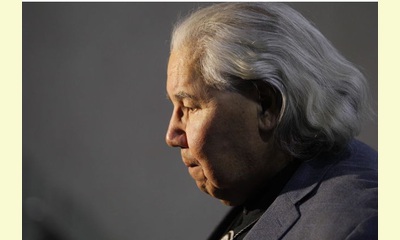|
|
Truth and Reconciliation Commission of Canada: Sinclair issues challenge to help heal pain of schools
un article par Ashley Prest, Winnipeg Free Press (abridged)
Justice Murray Sinclair, the head of a commission
investigating the excesses of Indian Residential
Schools, said on Thursday that a fundamental
change in attitudes and recognition of the past
were vital to heal the harm and alienation inflicted
by more than a century of mistreatment. 
Justice Murray Sinclair: ‘Reconciliation is a hard road.’ Photo by Boris Mikevich, Winnipeg Free Press
click on photo to enlarge
Sinclair chairs the Truth and Reconciliation
Commission of Canada, due to report next June
on the effects of the 142 government-run schools
on the more than 150,000 aboriginal children
taken from their homes and uprooted from their
culture starting in the 1870s. The last such
institution closed in 1996.
In an address to several hundred spectators at the
University of Manitoba’s Engineering and
Technology Complex entitled "If You Think Truth
is Hard, Reconciliation is Harder," he challenged
everyone to help make the necessary change.
Sinclair said the key to moving on from the
suffering and shame will hinge on recognition of
what took place.
"Things are going to change and if they’re going
to change, we need to set the terms of what those
future changes are going to result in." he said.
"Reconciliation is a hard road."
Sinclair said the commission had conducted four
years of hearings and investigations and compiled
accounts in video and spoken word from 7,000
survivors. The groundwork had already begun to
include the commission’s findings and the history
of the IRS system in school curriculums across
the country.
"Getting people to understand will allow us to
appreciate the significance of putting changes into
our curriculum so that there is a more balanced
approach to the teaching of Canadian history and
about aboriginal people," Sinclair said.
He said commission members have met ministers
of education from across Canada twice in their
annual meetings to "convey to them the
importance of curriculum change."
"But also (to convey) the question of holding them
accountable to ask them to show us what they’re
going to be doing. They’ve been very co-operative
and I must say, very anxious to make sure they do
the right thing," Sinclair said. "They know, as do
many leaders in Canadian society, that things are
changing and they have to keep ahead of the
change so they have some input as to where that
change is going to take us."
Sinclair was speaking at the U of M, site of the
national research centre and archives for the
commission, as the 2014 Distinguished Knight
Visitor as part of a special enrichment program to
assist academics and the community at large.
Knowing the truth, he said, will allow everyone —
indigenous and non-indigenous — to move
forward to a shared future.
"It is about creating a relationship founded on
mutual respect between aboriginal and non-
aboriginal people. It is through the establishment
of relationships that we are going to be able to
achieve a good nation," he said.
He said neglect, abuse and oppression suffered
by the incarcerated children constituted genocide
under the terms of the Geneva Convention
definition and it was up to this generation to start
down the path of reconciliation. . .
|








|
DISCUSSION
Question(s) liée(s) à cet article:
Truth Commissions , Do they improve human rights?
* * * * *
Commentaire le plus récent:
The following is excerpted from an article by Ernesto Semán, professor at the University of Richmond in the U.S. He looks at the recent torture report to the U.S. Senate in the light of the history of U.S. implication in the torture that took place in previous decades in Latin America. As he points out, the torture is only the most recent expression of American policies that amount to a form of state terrorism.
. . . instead of accepting the significance of the war on terror in undermining the rule of law, the report has served the Obama administration as another component of an ideological spinning wheel. . ... continuation.

|
|









